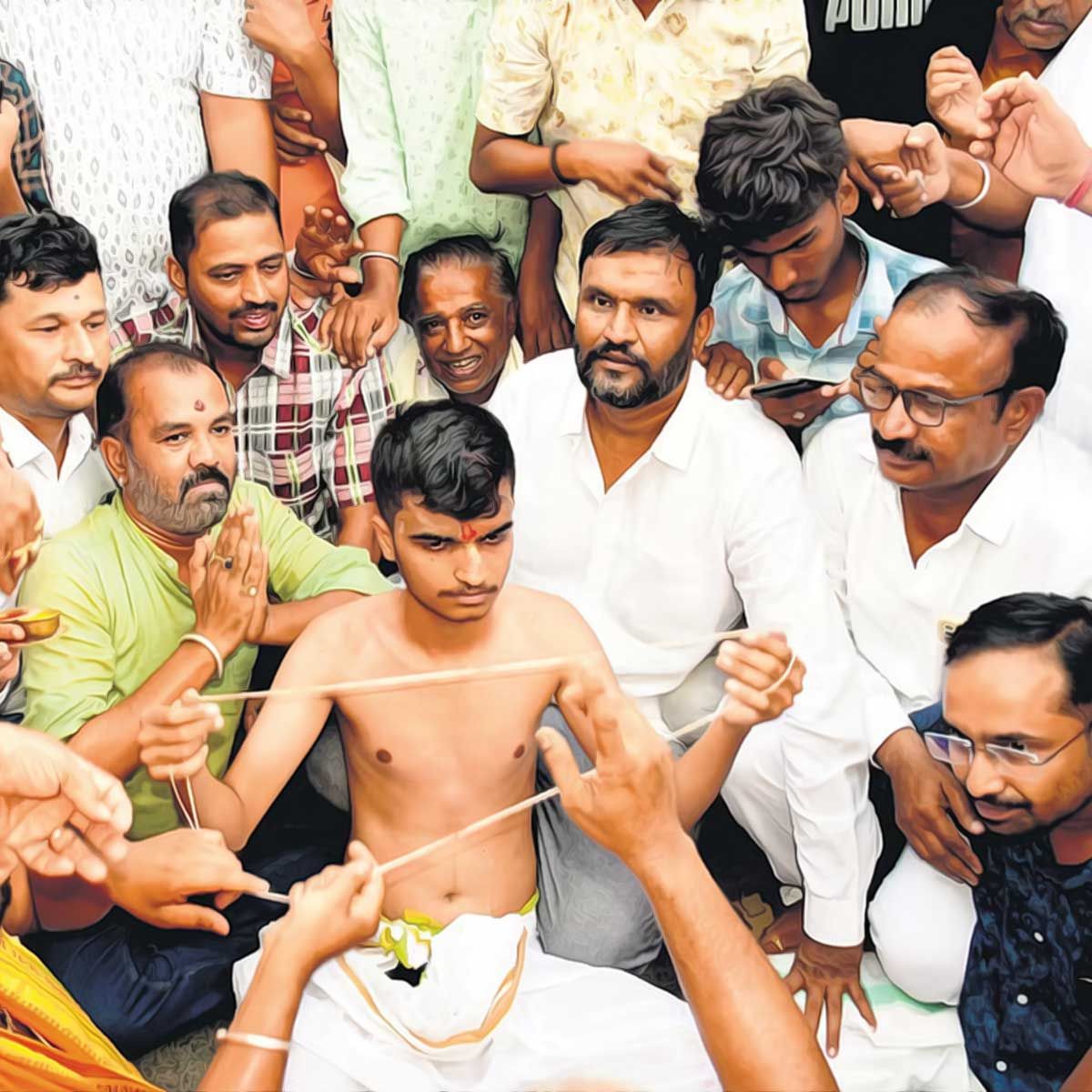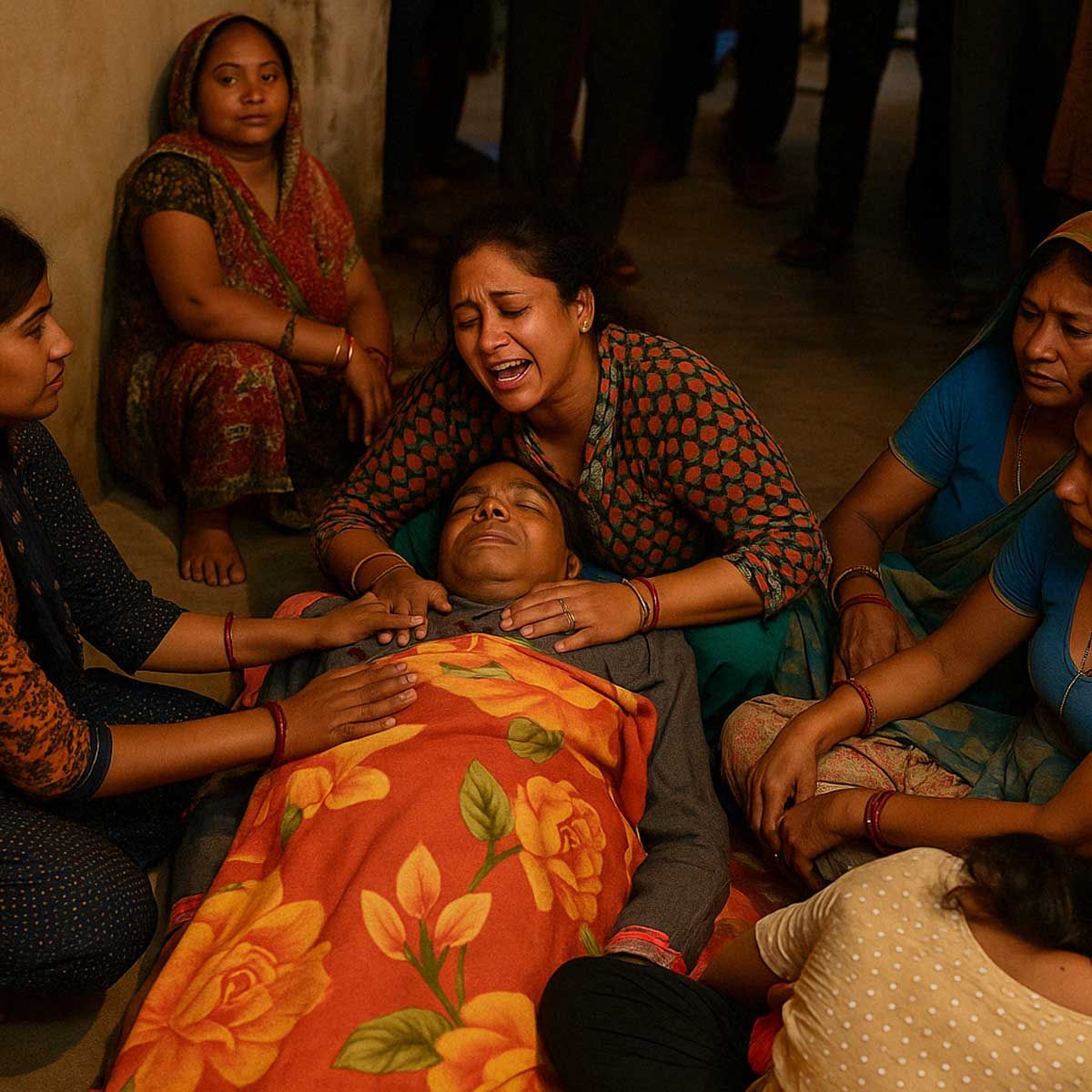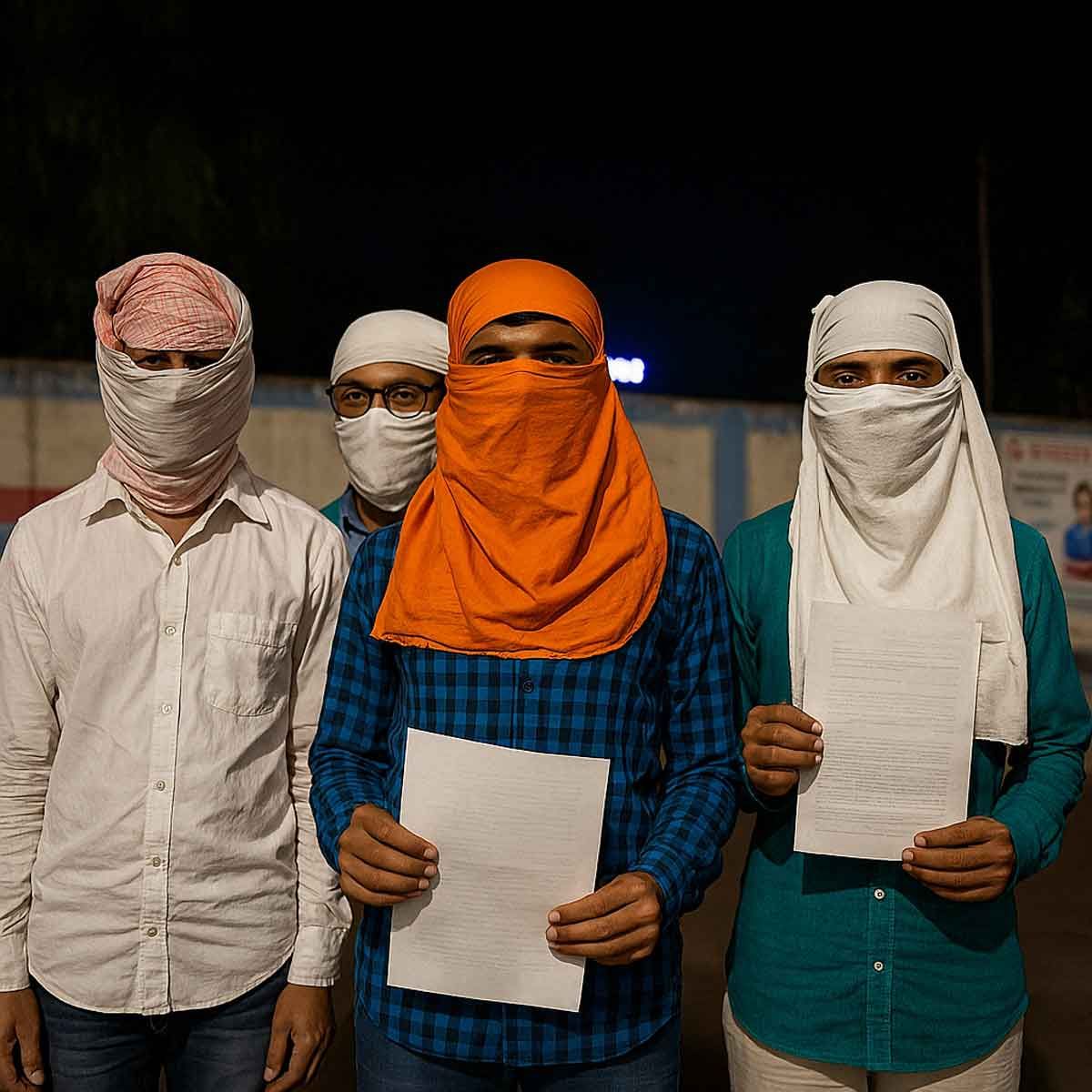More Coverage
Twitter Coverage
Satyaagrah
Written on
Satyaagrah
Written on
Satyaagrah
Written on
Satyaagrah
Written on
Satyaagrah
Written on
JOIN SATYAAGRAH SOCIAL MEDIA
"Countdown begins… Tick Tock Tick": In a bold move, Yogi Adityanath issues an order for the removal of all 'halal' certified items from stores in just 15 days, decision sparks debate on religious certifications, and the broader impact on the food industry

The Yogi Adityanath-led government in Uttar Pradesh has initiated a directive that has significant implications for the food industry in the state. "The Uttar Pradesh government has granted department stores, outlet chains, and retailers a 15-day period to remove any food items with halal certification from their inventory." This order marks a bold move that directly impacts how food products are certified and presented to consumers within the state.
|
The directive extends beyond just retailers. "Additionally, it has ordered 92 State-based manufacturers who obtained halal certification for their goods from non-certified organizations to either recall their products within Uttar Pradesh or repackage them." This specific instruction reflects a deeper scrutiny into the certification process, ensuring that manufacturers adhere to new regulatory standards set by the state government.
The recent actions taken by the state authority highlight a systematic approach to enforcing this new policy. "On 18th November, the State outlawed the manufacturing, distribution, storage, and retailing of food items bearing halal certification." With this move, Uttar Pradesh has taken a stand that not only affects the supply chain but also sends a clear message about the state's stance on food certification practices.
To ensure compliance, the government has undertaken a thorough examination of the market. "Following that, it looked into about 500 establishments in various districts and 97 locations throughout the state to find halal-certified goods." This extensive investigation demonstrates the government's commitment to enforcing this new rule across the state's food market.
The results of these investigations have led to significant enforcement actions. "Up to this point, it has seized about 3,000 kg of halal-certified goods costing Rs 7 to 8 lakh." The confiscation of such a large quantity of goods illustrates the tangible impact of the government's order on businesses and raises questions about the future of food certification and commerce in Uttar Pradesh.
|
The Uttar Pradesh government's firm stance on halal certification irregularities continues to unfold as they take legal action against four companies. The case, initially handled by the Hazratganj police station, has been elevated to the jurisdiction of the Special Task Force (STF) of the U.P. police, indicating the severity with which these alleged malpractices are being viewed.
The legal ramifications for these companies are substantial. "The FIR has been registered under Sections 120B (criminal conspiracy), 384 (extortion), 420 (cheating), 467 (forgery), 468 (forgery for the purpose of cheating), 471 (using as genuine a forged document), 153A (promoting enmity between different groups), and 298 (intent to wound religious feelings) of the Indian Penal Code (IPC) in response to a complaint by a Bharatiya Janata Yuva Morcha (BJYM) office-bearer." This array of charges paints a picture of a complex and multifaceted legal battle that these companies are set to face. The charges range from criminal conspiracy to intent to wound religious feelings, underscoring the intricate nature of this issue as it intertwines legal, ethical, and communal threads.
The complaint at the heart of this FIR is laden with serious accusations. "The BJYM personnel alleged that few companies certified certain products as halal to boost sales among people from a certain community for monetary gains, and this amounts to forgery and cheating." This allegation suggests a manipulative intent behind the halal certification, implying that it was used more as a marketing tool to target specific demographics rather than a genuine reflection of the products' compliance with halal standards.
This case highlights the sensitive intersection of commerce, religion, and ethics. If these allegations are proven, it could signify a significant breach of trust between these companies and their consumers, particularly those from the community targeted by such marketing strategies. Moreover, it would raise critical questions about the integrity of halal certifications and the responsibility of companies in ensuring the authenticity of their product claims.
|
Anita Singh, the Commissioner of Food Safety and Drug Administration, provided crucial insights into the ongoing situation regarding halal certification irregularities in Uttar Pradesh. Her statement sheds light on the regulatory measures being taken to address these issues.
“As of now, there are only three organizations in India, including one in Lucknow, which is registered with the National Accreditation Board for Certification Bodies (NABCB) under I-CAS, which are authorized to give halal certification to meat and meat products for export. In addition to this, there are 700-800 organizations across India that have been issuing the halal certification. We have banned all such products, till these companies register with NABCB,” Singh explained in her comments to TOI. This statement underscores a significant discrepancy between the number of organizations currently providing halal certifications and those officially recognized and accredited to do so.
Her comments reveal that out of the many organizations issuing halal certifications, only a few have the legitimate authority under the NABCB to do so. This situation points to a widespread lack of regulation and oversight in the halal certification process, leading to the current clampdown by authorities.
Singh's announcement of the ban on all such products until proper registration with NABCB is completed indicates a strong response aimed at rectifying these regulatory oversights. This move is not just a measure to ensure compliance but also serves to restore trust in the halal certification process, assuring consumers that certified products meet the required standards.
|
The reaction from the market to these stringent measures has been to seek more time to comply. "Supermarket chains, retailers sought one month’s time from the govt," reflecting the challenges businesses face in adapting to these new regulatory requirements. This request for additional time suggests that the industry needs a period of adjustment to align with the new standards and procedures set forth by the government.
The latest developments in Uttar Pradesh's crackdown on halal certification highlight the challenges facing retailers and the proactive steps taken by the Department of Food Safety. Anita Singh, the Commissioner of Food Safety and Drug Administration, has articulated the current stance of the government and its interactions with retailers in the state.
"She asserted that the Retailers Association of India and chains such as Spencer sought for a month to remove halal-certified products from their shelves but have only been given 15 days." This statement highlights the tight timeline imposed by the government, reflecting the urgency with which the state is addressing the issue. While retailers have requested more time to comply with the order, the government's decision to stick to a 15-day period underscores its commitment to swift enforcement of the new regulation.
|
The scope of the crackdown is wide, as indicated by Singh. "So far, the Department of Food Safety has seized several halal-certified food items, including sugar, oil, bakery items, sauces, rice, and so on." The variety of products seized demonstrates the pervasiveness of halal-certified items in the market and the government's thorough approach to enforcing its directive.
Notably, the geographic spread of these products is significant. "Many of these items have been produced in states such as Madhya Pradesh and Maharashtra, as well as in Gurgaon." This detail points to the inter-state nature of the supply chain involved in the distribution of these products, suggesting a broader impact beyond the borders of Uttar Pradesh.
In terms of enforcement, Singh outlined the department's approach for the immediate future. "For the next two weeks or so, until retailers and other sellers recall halal-certified products, Singh said, the department will continue to inspect to ensure the new order is followed but will not take any punitive action." This approach reflects a balance between ensuring compliance and providing a brief grace period for retailers to adjust to the new regulations. By refraining from punitive action during this period, the government is allowing some room for businesses to align with the new mandate while still emphasizing the importance of adherence to the directive.
|
The concept and definition of 'Halal,' particularly in the context of the recent actions taken by the Uttar Pradesh government, is crucial to understand the nuances of the issue at hand.
"The term Halal is used for products, services, or systems that are considered lawful (Tayeib) or permissible under the Islamic Shariah law that do not consist of or contain any part that is considered unlawful (haram) according to Islamic law, and/or the actions permitted by Shariah law without punishment imposed on the doer." This definition provides a comprehensive understanding of what constitutes 'Halal' in Islamic jurisprudence. It implies a broad spectrum of compliance - not only do products, services, or systems need to avoid elements considered 'haram' or forbidden, but they also must adhere to practices that are deemed permissible and lawful within the framework of Islamic law.
The significance of this definition becomes particularly relevant in light of the recent government directive in Uttar Pradesh. The decision to regulate and scrutinize halal certification implies a governmental intervention in a religiously defined process. Understanding the religious and cultural importance of halal certification is essential in this context. For many consumers, particularly those of the Islamic faith, halal certification is not merely a label but a guarantee that the products they use comply with their religious beliefs and practices.
|
The implications of this directive, therefore, extend beyond the realm of food safety and enter into the domain of religious practice and cultural observance. As the government of Uttar Pradesh enforces its new policies regarding halal certification, the intersection of law, religion, and consumer rights is brought into sharp focus, raising questions about the balance between regulatory oversight and respect for religious practices.
This development in Uttar Pradesh is likely to have far-reaching implications, not only for those directly involved in the production and sale of halal-certified products but also for the broader community of consumers who rely on these certifications to make informed choices that align with their religious and cultural values.
 |
 Support Us
Support Us
Satyagraha was born from the heart of our land, with an undying aim to unveil the true essence of Bharat. It seeks to illuminate the hidden tales of our valiant freedom fighters and the rich chronicles that haven't yet sung their complete melody in the mainstream.
While platforms like NDTV and 'The Wire' effortlessly garner funds under the banner of safeguarding democracy, we at Satyagraha walk a different path. Our strength and resonance come from you. In this journey to weave a stronger Bharat, every little contribution amplifies our voice. Let's come together, contribute as you can, and champion the true spirit of our nation.
 |  |  |
| ICICI Bank of Satyaagrah | Razorpay Bank of Satyaagrah | PayPal Bank of Satyaagrah - For International Payments |
If all above doesn't work, then try the LINK below:
Please share the article on other platforms
DISCLAIMER: The author is solely responsible for the views expressed in this article. The author carries the responsibility for citing and/or licensing of images utilized within the text. The website also frequently uses non-commercial images for representational purposes only in line with the article. We are not responsible for the authenticity of such images. If some images have a copyright issue, we request the person/entity to contact us at This email address is being protected from spambots. You need JavaScript enabled to view it. and we will take the necessary actions to resolve the issue.
Related Articles
- UP CM Yogi Adityanath directs that there will be no Namaz on the streets in Uttar Pradesh, says, "Removal of thousands of mics and loudspeakers from religious places brought great relief to people in the state"
- Savitri Devi broke into tears when Yogi Adityanath decided to leave for Gorakhpur to take vow of sainthood, and today her eyes contain the same tears brimming with pride Yogi has emerged as a Chief Minister of Uttar Pradesh
- Kanpur police releases poster of 40 suspects involved in Kanpur Violence that broke out after Namaz last Friday, WhatsApp number provided for people to inform about miscreants, will be rewarded in cash: SP leader Nizam Qureshi name included
- "हलाल का हलाला, बेचाला": In a bold move of setting new standards by Yogi Adityanath, UP govt conclusively bans production, storage, sale of ‘Halal certified’ food items with immediate effect, citing violation of the Food Safety and Standards Act
- During the Durga Visarjan in Bahraich, UP, Muslims objected to DJ music, leading to stone-pelting from their side, Ramgopal Mishra, recently married, was shot 24 times; eyewitnesses allege attackers used the police lathi-charge to kill him, blaming police
- "Collective responsibility to maintain the law and order. Think about the future. Don’t spoil your own future by your own deeds": Mosques and Muslim leaders appeal the Muslim community to not indulge in violence after Friday prayers
- UP CM Yogi Adityanath Govt forbade Namaz on the roads or public places on Alvida Juma, the last Friday of Ramzan: Religious leaders appeal to Muslims to limit themselves to mosques
- "Identify anti-CAA and NRC rioters, members of the PFI": Instructions to all district police chiefs, Uttar Pradesh govt increases security around mosques to prevent violence after Friday prayers, to use drones, conduct flag march and drills
- "असलियत": Sudhakar Tiwari, who survived the attack alongside Ramgopal Mishra, confirmed that people from the mosque initiated the assault on Hindus during a Navratri procession in Bahraich, leading to brutal violence, fatal gunfire & Mishra's tragic death
- National anthem mandatory for students and teachers before commencing classes every day in all madrasas in Uttar Pradesh: earlier only Hamd (praises to Allah) and Salam (salutations to Muhammad) were recited
- "बिस्मिल्लाह बोलूंगा, योगी की कुर्बानी दूंगा": Muslim migrant workers in Delhi threatened to "sacrifice" Yogi Adityanath over Ram Mandir, praised Mamata Banerjee for PM 2029, justified Mamata’s failures, and defended communal priorities
- "ठाएं ठाएं": Sarfaraz & Talib, the ruthless killers of Hindu man Ram Gopal Mishra during the blood-soaked Bahraich Durga Puja violence gunned down by police while desperately fleeing to Nepal; now both lie in hospital, awaiting the full weight of justice
- BJP’s aim to restore the Sanatan faith, glorious history and pride of India: ‘How can Mathura-Vrindavan be left behind,’ says Yogi Adityanath ahead of visiting Krishna Janmabhoomi
- "Every problem has a gift for you in its hands": Prayagraj | Uttar Pradesh Chief Minister Yogi Adityanath will hand over keys to beneficiaries of flats in PM urban housing scheme developed on land confiscated from slain mafia-turned-politician Atiq Ahmad
- "जाहिलाना": Nails ripped off, bullet holes and severe injury marks reveal that 22-year-old Ram Gopal Mishra brutally tortured by Islamists during a Durga procession in Bahraich, Uttar Pradesh, before being killed, post-mortem confirms the horrific details




























